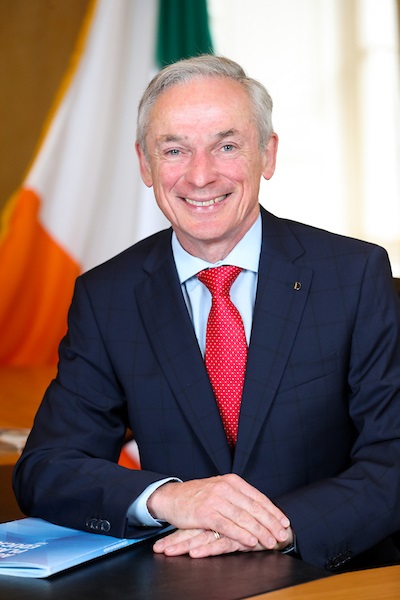Erasmus to help improve foreign language learning strategy
By Aoileann Ní Bhroin
Posted: 4 December, 2017

The Minister for Education and Skills, Richard Bruton, T.D. has launched the government’s Strategy for Foreign Languages in Education 2017-2026. The Plan sets out a roadmap to put Ireland in the top ten countries in Europe for the teaching and learning of foreign languages, through a number of measures targeted at improving proficiency, diversity and immersion. As part of the plan the Minister wants to see a 50% increase in the number of participants in Erasmus+ 2026.
The delivery of the Strategy is a key action in the Minister’s Action Plan on Education which aims to make Ireland’s education and training service the best in Europe within a decade. The Minister also published a five year implementation plan.
In the context of Brexit and the increasing importance globally of non-English speaking countries, Minister Bruton is taking action to ensure Ireland is well prepared for the challenges that lie ahead. Once the United Kingdom leaves the European Union, Ireland will be one of only two English speaking countries in the Union. This Strategy is crucial to ensuring Ireland is prepared for a changed European dynamic.
These challenges also provide opportunities. The teaching of the Irish language from an early age, mean our children are exposed to bilingualism from a young age. Our position as a small, open economy at the centre of the world, also puts us in a unique position. This Strategy will allow us to maximise our assets, by ensuring our education and training service is well equipped to respond to a changing global environment.
Under the Foreign Languages Strategy we will:
- Increase the number of post-primary schools offering two or more foreign languages by 25%
- Increase the number of students sitting two languages at Junior Certificate and Leaving Certificate by 25%
- Increase the number of students in higher education studying a foreign language, in any capacity, as part of their course, by 20%
- Increase the number of participants in Erasmus+ by 50%
- Double the number of teachers participating in teacher mobility programmes
- Double the number of foreign language assistants in schools
- Improve learners’ attitude to foreign language learning
- Improve the quality of foreign language teaching at all levels
There are 100 actions in the Strategy, including:
- Introduce Mandarin Chinese as a Leaving Certificate subject
- Introduce curricular specifications for heritage speakers for Polish, Lithuanian and Portuguese
- Develop a range of short courses in languages for Junior Cycle
- Explore the potential for introducing bonus points at Leaving Certificate for studying foreign languages in cases where students apply for higher education courses in language-related areas
- Enhance employer engagement in the development of new trade languages
- Increase the opportunities for short-term teacher exchanges for post-primary teachers
- Carry out periodic surveys of students’ attitudes and experiences of foreign language learning
- Incentivise schools to diversify their language offer, including by means of concessionary hours, where appropriate
- Progress pilot programme for co-operation with foreign-owned companies, or indigenous companies with a foreign presence, to enable students in Further Education and Training and Higher Education to do work placements in the parent country
- Implement the newly developed Junior Cycle short course in Lithuanian
- Appoint “language champions” from business and other sectors to demonstrate the opportunities available for graduates with foreign language competences
- Develop new models of delivering language teaching, such as shared classes and blended learning. This will allow students who are part of small immigrant communities, within specific schools, to develop their heritage language skills.
Implementation of this ambitious strategy will require significant changes to how foreign languages have been taught in the past and will require extra resources. The Minister is confident that the correct policies will be put in place under this strategy to increase the number of foreign language teachers. The strategy contains a number of actions to ensure we have a steady supply of teachers to deliver on the ambition of the Strategy, such as:
- A baseline data collection exercise to understand current supply of foreign language teachers
- Research to identify future language needs, with the aim of ensuring provision and uptake in line with those needs.
- Identify teachers who are qualified to teach a foreign language but who may not have had the opportunity to teach that language in their schools. Provide opportunities and incentives for these teachers to upskill by means of Continuing Professional Development (CPD) or post-graduate courses.
- Consider the possibility of a post-graduate programme for teachers, with a language, who may be able to learn another language
- Explore the potential for alternative, flexible models such as blended learning (a combination of face-to-face teaching with computer technology), clustering learners, and evening/weekend classes.
- Incentivise schools to diversify their language offer, including by means of concessionary hours, where appropriate.
The Minister has also asked that a number of other options be considered in order to incentivise students to undertake the two year postgraduate course in education, including financial supports.
Speaking at the Launch, Minister Bruton said
‘If we want to have the best education and training service in Europe by 2026, we must make the teaching and learning of foreign languages a key priority. Brexit and the increasing importance of non-English speaking countries globally, mean that English-speaking countries such as our own, will need to put a new found importance on foreign languages in order to excel in the modern world.
“As well as the obvious economic advantages, the teaching and learning of foreign languages also has significant cultural and social importance. There are few more effective ways to understand and embrace another culture than by learning their language.
“A key part of this strategy is not only increasing the numbers of children taking up a foreign language, but also diversifying the range of languages available to schools and increasing students depth of knowledge in a language.
“Learning a foreign language is no longer a luxury for some but a necessity for most. It is an international key which upon turning will open many doors and opportunities for those that embrace and enjoy the challenge.
“I have put together a 5 year Implementation Plan 2017 – 2022, which sets out our annual targets to ensure we can meet our ambitions. I look forward to seeing our progress in this vital area.”
Languages Connect: Ireland's Strategy for Foreign Languages in Education 2017-2026


